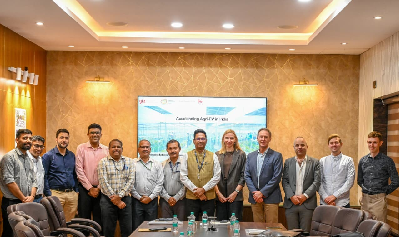Monday, 23 February 2026

Germany and India are accelerating collaboration in agrivoltaics and climate-smart agriculture. A high-level German delegation, led by Johann Saathoff, Parliamentary State Secretary, Federal Ministry for Economic Cooperation and Development (BMZ), visited the 100 kW AgriPV Pilot Site at the ICAR–Indian Agricultural Research Institute (IARI) , to review joint research progress and expand bilateral cooperation.
The visit showcased India’s early strides in integrating solar power generation with crop cultivation to improve land-use efficiency, reduce carbon intensity, and boost farm incomes. The Centre of Excellence on AgriPV, jointly established by IARI and the National Institute of Solar Energy (NISE) and supported by GIZ India, has been approved by the Ministry of New and Renewable Energy (MNRE) as part of a broader clean-energy innovation push.
The delegation held discussions with senior leadership from ICAR, IARI, NISE, and partner institutions on scaling agrivoltaics across diverse agro-climatic zones, strengthening research data infrastructure, and enabling farmer adoption through policy support and techno-economic models. Scientists highlighted progress on net-zero farming frameworks, resource-efficient irrigation, and digital decision-support systems linked to AgriPV installations.
India’s rapidly expanding renewable energy capacity — paired with its agricultural transformation ambitions — positions Indo-German collaboration as a critical driver of climate resilience and future-ready farming systems. With pilot learnings now maturing, both countries are evaluating broader deployments and co-innovation avenues to accelerate agrivoltaics from experimental to mainstream.